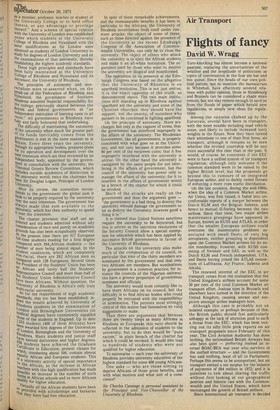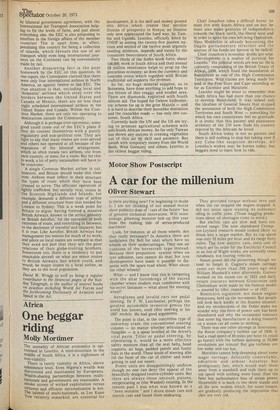Air Transport
Flights of fancy
David W. Wragg
Euro-knocking has almost become a national pastime, replacing the uncertainties of the weather and the ineptitude of politicians as topics of conversation in the four ale bar and bus queue. Since the heads of our own poli tical parties, not to mention the bureaucrats in Whitehall, have effectively severed relations with public opinion, those in Strasbourg and Brussels can be considered a shade more remote, but not alas remote enough to save us from the floods of paper which herald new regulations, or simply new ideas for regulations.
Among the victories chalked up by the Eurocrats, several have been in transport, with the more notable including road vehicle noise, and likely to include increased lorry weights in the future. Now they have turned their attentions to one of their first loves, air transport, although it remains to be seen whether the revised courtship will be any more successful this time than in the past. It would, of course, be consistent if the EEC were to have a unified system of air transport • regulation, although only welcome if the common standard were to be raised to the higher British level, but the proposals go beyond this to rumours of an integrated European airline, and to darkly veiled threats of enforcing a more even traffic distribution.
On the last occasion, during the mid-1960s, when the idea of a Common Market airline, Air Union, was first raised, it faded into un confirmable reports of a merger between the Dutch KLM and the Belgiiin Sabena, and hence to mutual ill-feeling between the two airlines. Since that time, two major airline maintenance groupings have appeared in Europe, known as KUSS and ATLAS, in order that the smaller European airlines could overcome the maintenance problems as sociated with small fleets of very big aeroplanes; neither grouping is dependent upon the Common Market airlines for its entire membership, however, with KUSS con sisting of Swissair and SAS, as well as the Dutch KLM and French independent, UTA, and Iberia having joined the ATLAS consortium of. Lufthansa, Air France, Sabena and Alitalia.
The renewed interest of the EEC in air transport comes from the realisation that the United Kingdom's airlines account for some 30 per cent of the total Common Market air transport effort. Jealous eyes in Brussels and elsewhere have turned in the direction of the United Kingdom, causing unease and suspicion amongst airline managers here.
Although this case is probably not an isolated example, or perhaps because of this, the British public should feel pahicularly unhappy at the lack of attention paid to such a threat from the EEC; which has been trot ting out its silly little pink reports on air transport proposals since February of this year. The Civil Aviation Authority has done nothing, the nationalised British Airways has also been quiet — preferring instead an internal BOAC-BEA war over who.survives in the unified structure — and the Government has said nothing, least of all to Parliament. Perhaps this seems to be unimportant, but air transport earned a net surplus for the balance of payments of £64 million in 1972; and it is pointless to talk about sharing the traffic without first looking at our geographical position and historic ties with the Commonwealth and the United States, which have encouraged the growth of British airlines.
Since international air transoort is decided by bilateral government agreeinent, with the International Air Transport Association helping to fix the levels of fares, and just about everything else, the EEC is also proposing to interfere in the foreign affairs of the member countries! This is apart from, in effect, Penalising this country for being a collection of •islands, which favours the use of air transport while even long international journeys on the Continent can bq conveniently made by rail. Another disquieting fact is the poor homework by the EEC on this question. In one report, the Commission claimed that there were only four international airlines in North America, as against twelve in the EEC. The true situation is that, excluding local and 'domestic' airlines which stray over the borders between the United States and Canada or Mexico, there are no less than eight scheduled international airlines in the United States and Canada. Within the Common Market, there are only ten operating to destinations outside the Community.
Although it is perhaps over-optimistic, some good could come out of the EEC's plans if they do content themselves with a purely regulatory and non-political role. They are right to say that many routes are over-served and others not operated at all because of the imposition of the bilateral arrangement, which so often means two airlines, one from each country, or none, for a route. But for this to work, a lot of petty nationalism will have to be overcome.
A single Common Market airline is out, however, and Britain should make this clear now. Airlines must reflect in their structure the types of route which they have been created to serve. The efficient operation ot lightly trafficked, but socially vital, routes in the Scottish Highlands and Islands, for example, demands a different type of airline and a different structure from that needed for London to Sydney. This is a weak point for Britain to argue, having formed a massive British Airways, known to the airline industry as 'British Aeroflot,' for the operation of both extremes of route, and everything in between, to the detriment of traveller and taxpayer, but it is true. Like Aeroflot, British Airways has Management too remote for much of its work, and pilots on local routes are overpaid so that they need not feel that they are the poor relations of their globe-trotting brothers. Sometimes too, there is a tendency to put unsuitable aircraft on what are minor routes to British Airways, but which could, and would, be major routes to a local airline, as they are to the local population.
David W. Wragg as well as being a regular contributor to the financial pages of the Sunday Telegraph, is the author of several books on aviation including World Air Forces and the forthcoming Dictionary of Aviation and Sneed in the Air.



































































 Previous page
Previous page